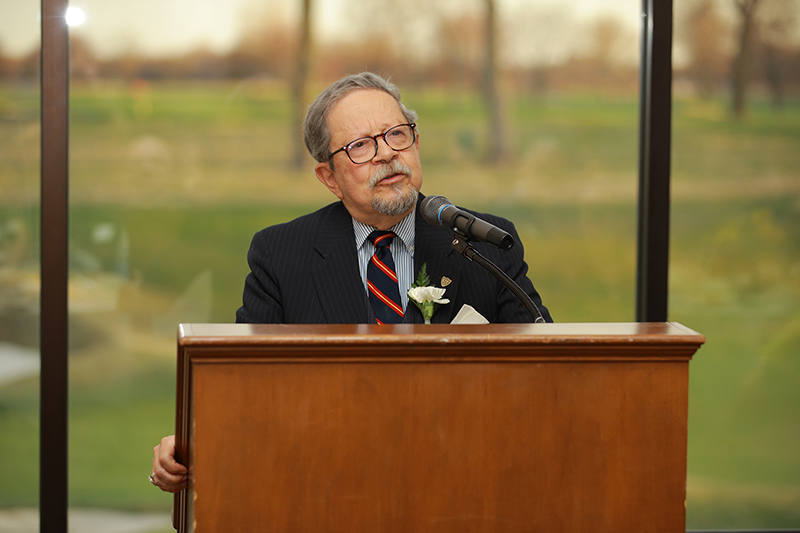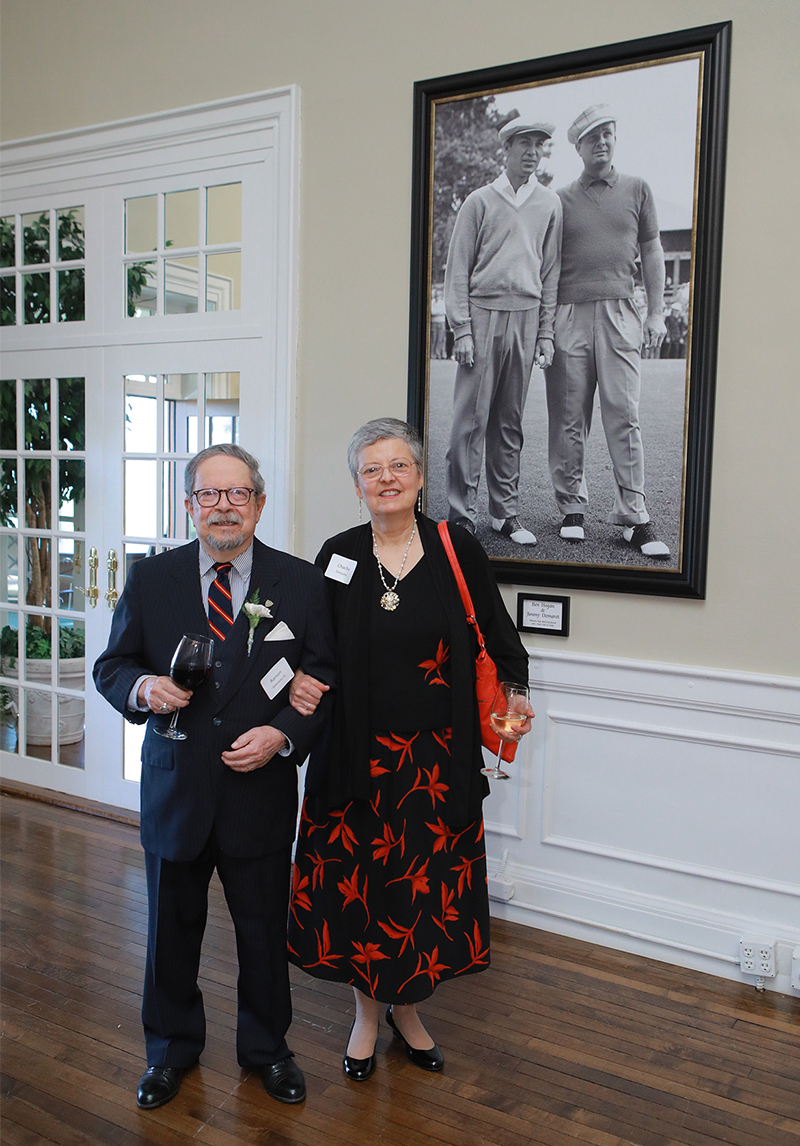Tales of travel
Amateur archaeologist, former CIA officer, stockbroker earns Pacemaker Award
By Laurie B. Davis
During his career, Ramon E. Gonzalez III (Bus.’61) spent many years traveling the world, collecting a curious array of encounters with politicians, presidents, an Orthodox patriarch, and one wild jaguar, among many others.

As he traveled the globe, Gonzalez gathered stories about the people he met, but he also expanded his personal collection of fossils, coins and other artifacts. The amateur archaeologist visited UToledo with his wife, Ofelia, last month to collect the highest honor bestowed on an individual by the College of Business and Innovation, the Pacemaker Award. The honor recognizes outstanding achievements in business, as well as contributions to the community and the University.
Shortly after graduating from UToledo, Gonzalez joined the U.S. Army, in which he reached the rank of captain. He also served for two years as a staff member of the House Appropriations Committee in Washington D.C. before joining the Foreign Service for 13 years. In 1979, the year his son, Steven, was born, Gonzalez began a 20-year career as a stockbroker for Merrill Lynch.
This multifaceted career was his ticket to so many destinations: places like Bagan in the former Burma, and the Arbat in Russia. A commanding officer insisted that Gonzalez go to Bagan, “a city once burned by Genghis Khan,” says Gonzalez. “But he left 365 pagodas there.” His superior officer knew he was an archaeology buff, so he told Gonzalez that he would pay for his transportation with a bottle of whiskey and for his hotel room with a second bottle. He needed to get his visa in one day and learned that the bartering system came in handy to make that happen. This time, Gonzalez traded tennis balls for a quick turnaround, and off to Bagan he went.
While there, he says, “I got a guy, and he’d come and pick me up every morning in a two-oxen drawn cart, and from 5 a.m. to 6 p.m. every day, I’d search through the ruins. I found pottery there that went back 2,000 years. And just beautiful things,” Gonzalez says.
In Burma, Gonzalez also met “The Venerable,” a blind Buddhist monk, who told the story of hiding American and British airmen during World War II. “I said, if the Japanese would have found them, they would have killed you.” The Venerable replied: “Americans are good people; Japanese soldiers are not.” Gonzalez says that right in front of where they were speaking, was a small plot filled with weeds. I asked him what it was. “A cemetery,” the monk replied. “Who’s buried there?” Gonzalez asked. “American and British pilots,” he was told. So, Gonzalez says, he and some other men cleaned up the cemetery before his departure.
While in the Army, Gonzalez visited all of the countries in Central and South America. He followed that stint with three months in Europe. “Then I visited the Far East and ended up visiting more than 100 countries. I loved it. I worked for the CIA, also known as the U.S. Foreign Service, and for 13 years I got to visit different parts of the world.”
At the Arbat in Moscow, local residents would sell many items in this self-made market. “You weren’t supposed to take anything out of Russia that was pre-1917,” says Gonzalez, which was the year Vladimir Lenin and the Bolsheviks seized power over the czarist-led Russia. In the Arbat, says Gonzalez, “there were women called babushkas — they were grandmothers — in the rain, selling beautiful tablecloths.”
Gonzalez bought fossils, of course. At the airport, the customs official asked him, “Do you have anything pre-1917?” “Yes, I do,” answered Gonzalez. “He didn’t know what to say because you weren’t supposed to take anything out. I said, 6 million years B.C., fossils, and he looked at me and started laughing nervously, saying, go, go, go.”

His father immigrated to St. Louis, Mo. in 1927 and joined the Illinois Glass Co. in Alton, Ill. When the Owens Bottle Co. and the Illinois Glass Co. merged, Gonzalez’s father came to Toledo to work at Owens-Illinois Glass as the general sales manager for central and northern South America. Gonzalez says his son, Steven, who lives in Phoenix, Ariz., now makes the third generation of salesmen in the family.
Gonzalez credits UToledo for much of his success. “If it weren’t for The University of Toledo, I wouldn’t have gotten as far in my life as I did. It’s where you learned how to solve problems and not have them solved for you.”
Gonzalez strongly supports the College of Business and Innovation’s Edward H. Schmidt School of Professional Sales. “I’d like to give poor Hispanic students the same opportunity as I had,” he says, adding that his own family was middle-class. “Many Mexican families work in the same jobs as their families have done for generations in Mexico and Central America, but they know the value of a college degree.”






